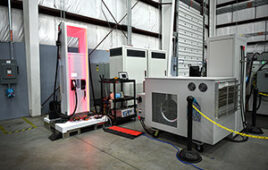 NEW YORK, NY – The Association for Computing Machinery (ACM) has named Leslie Lamport, a Principal Researcher at Microsoft Research, as the recipient of the 2013 ACM A.M. Turing Award for imposing clear, well-defined coherence on the seemingly chaotic behavior of distributed computing systems, in which several autonomous computers communicate with each other by passing messages. He devised important algorithms and developed formal modeling and verification protocols that improve the quality of real distributed systems. These contributions have resulted in improved correctness, performance and reliability of computer systems.
NEW YORK, NY – The Association for Computing Machinery (ACM) has named Leslie Lamport, a Principal Researcher at Microsoft Research, as the recipient of the 2013 ACM A.M. Turing Award for imposing clear, well-defined coherence on the seemingly chaotic behavior of distributed computing systems, in which several autonomous computers communicate with each other by passing messages. He devised important algorithms and developed formal modeling and verification protocols that improve the quality of real distributed systems. These contributions have resulted in improved correctness, performance and reliability of computer systems.
The ACM Turing Award, widely considered the “Nobel Prize in Computing,” carries a $250,000 prize, with financial support provided by Intel and Google.
ACM President Vint Cerf noted that “as an applied mathematician, Leslie Lamport had an extraordinary sense of how to apply mathematical tools to important practical problems. By finding useful ways to write specifications and prove correctness of realistic algorithms, assuring strong foundation for complex computing operations, he helped to move verification from an academic discipline to practical tool.”
Lamport’s practical and widely used algorithms and tools have applications in security, cloud computing, embedded systems and database systems as well as mission-critical computer systems that rely on secure information sharing and interoperability to prevent failure. His notions of safety, where nothing bad happens, and liveness, where something good happens, contribute to the reliability and robustness of software and hardware engineering design. His solutions for Byzantine Fault Tolerance contribute to failure prevention in a system component that behaves erroneously when interacting with other components. His creation of temporal logic language (TLA+) helps to write precise, sound specifications. He also developed LaTeX, a document preparation system that is the de facto standard for technical publishing in computer science and other fields.
The citation honoring Lamport highlights many of the key concepts of distributed and concurrent computing that he originated, including “causality and logical clocks, replicated state machines, and sequential consistency.” The citation also notes that, “along with others, he invented the notion of Byzantine failure and algorithms for reaching agreement despite such failures. He contributed to the development and understanding of proof methods for concurrent systems, notably by introducing the notions of safety and liveness as the proper generalizations of partial correctness and termination to the concurrent setting.”
Wen-Hann Wang, Intel Corporate Vice President and Managing Director of Intel Labs, hailed Lamport’s seminal contributions to the field of distributed systems. “His pioneering work in distributed and concurrent algorithms substantially improved consumer and industrial computing systems, ranging from multiprocessor technology used in data centers to multicomputer networks used in aircraft control systems,” he said. In particular, he added, “the brilliant ‘logical clock’ abstraction he introduced some 40 years ago has had an immense impact on the field. It provided an elegant framework for reasoning about distributed protocols which are critical elements of the interconnected world.”
Google Vice President of Research Alfred Spector noted that “with the growing shift to ever-larger scale distributed systems and cloud computing, Lamport’s work has taken on a significantly increased role. His results have benefited many research communities including those in parallel and high performance computing systems, concurrent algorithms, and software reliability. And, his work has had implications not just in the theoretical community, but also with the engineers and programmers who design and implement many types of systems.”
Background
Leslie Lamport received the IEEE Emanuel R. Piore Award for his contributions to the theory and practice of concurrent programming and fault-tolerant computing. He was also awarded the Edsger W. Dijkstra Prize in Distributed Computing for his paper “Reaching Agreement in the Presence of Faults.” He won the IEEE John von Neumann Medal and was also elected to the U.S. National Academy of Engineering and the U.S. National Academy of Sciences.
Prior to his current position, his career included extended tenures at SRI International and Digital Equipment Corporation (later Compaq Corporation). The author or co-author of nearly 150 publications on concurrent and distributed computing and their applications, he holds a B.S. degree in mathematics from Massachusetts Institute of Technology as well as M.S. and Ph.D. degrees in mathematics from Brandeis University.
ACM will present the 2013 A.M. Turing Award at its annual Awards Banquet on June 21, 2014, in San Francisco, CA.
About the ACM A.M. Turing Award
The A.M. Turing Award was named for Alan M. Turing, the British mathematician who articulated the mathematical foundation and limits of computing, and who was a key contributor to the Allied cryptanalysis of the German Enigma cipher and the German “Tunny” encoding machine in World War II. Since its inception in 1966, the Turing Award has honored the computer scientists and engineers who created the systems and underlying theoretical foundations that have propelled the information technology industry.
About ACM
ACM, the Association for Computing Machinery is the world’s largest educational and scientific computing society, uniting computing educators, researchers and professionals to inspire dialogue, share resources and address the field’s challenges. ACM strengthens the computing profession’s collective voice through strong leadership, promotion of the highest standards, and recognition of technical excellence. ACM supports the professional growth of its members by providing opportunities for life-long learning, career development, and professional networking.




